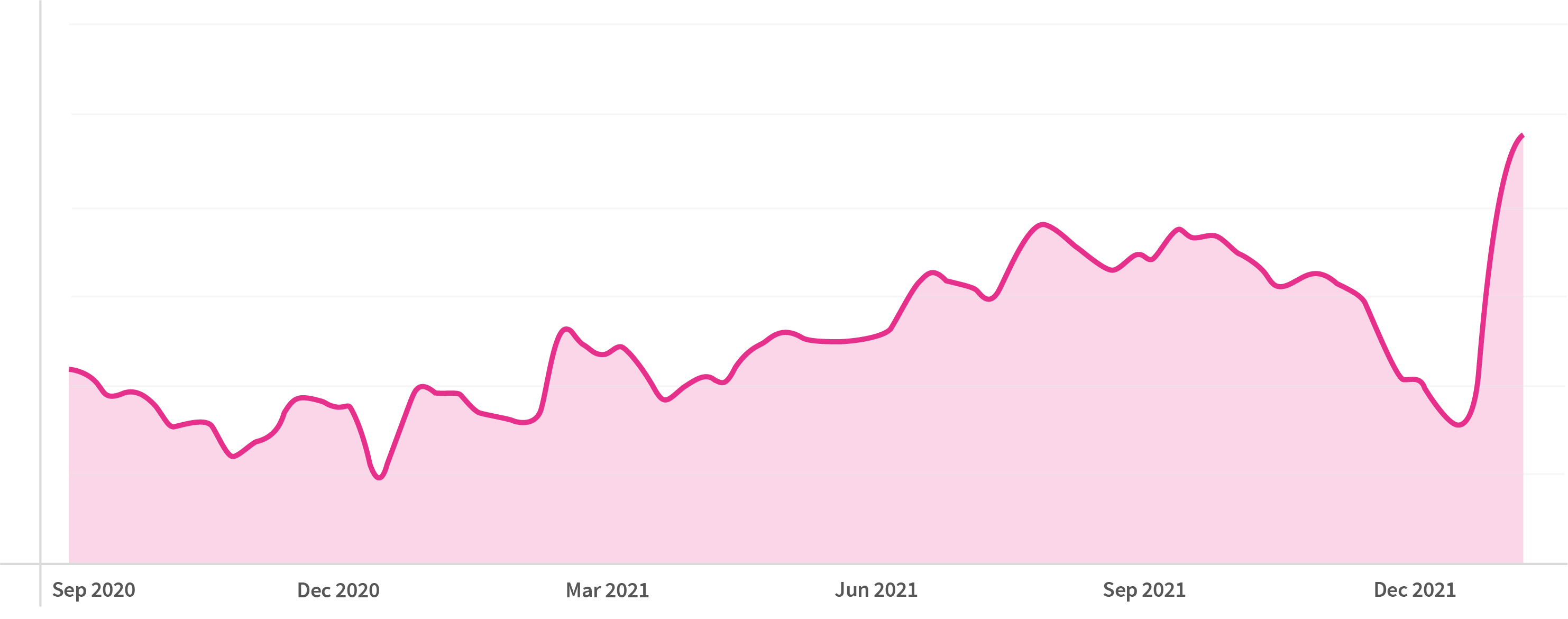After what’s been an incredibly tough few years, it appears that blue skies are finally poking through the clouds that have been looming over the travel industry.
Just one month into the year and our call data is showing that more would-be holidaymakers are reaching for their handsets – with calls up 123% in early January.

The introduction of the Green List and the easing of travel restrictions set call volumes on a steady upward trajectory, which steepened dramatically with the arrival of the new year in 2022.
The return of the ‘Big January Spike’ is promising. Swelling call volumes are a strong indication that a boost in enquiries and bookings is on the way.
While things have been looking up for the sector since the introduction of the Green List in 2020, the industry has a long way to go to make up for a devastating couple of years. While the uplift in calls we’re seeing is very promising, the overall numbers for early January 2022 are still lower than they were pre-pandemic. Though some of our clients are experiencing call volumes that exceeded the number they were previously seeing in January before Covid arrived, most are only receiving 75% of the call volumes they’d expect.
Things are heading in the right direction, but it’s important to remember there’s still work to be done to recuperate lost revenue.
It’s clear that not all aspiring vacationers are willing to commit to bookings just yet. Tighter purse strings, some lingering uncertainty and residual caution are all barriers travel businesses must overcome.
To clear these barriers from the road to recovery, businesses in the sector need to utilise an all too often undervalued channel – the call centre. Being able to speak to someone in person could be the key to converting an enquiry, and persuading people to part with their deposits.
Here are three key ways that the phone call will help with recovery:
Getting closer to customers
The growth in online as a channel for booking travel has brought huge benefits. Not only is it quick and easy for the consumer, but it also leaves a digital trail that helps companies gain a better understanding of their customers. But the phone call has the ability to add another layer of insight into the customer journey.
By tracking calls travel companies can see exactly where calls are coming from and what’s triggering them. It also shows them where each caller is located, or the last page of your website they looked at before they called.
Linking previous online visit history to the eventual phone call gives companies a more holistic view of the customer’s journey and their preferences – putting call handlers in a strong position to provide the best service and seal the deal.
Adding value
The opportunities to up-sell increase significantly once customers are engaged on a phone call. Using information gathered from their offline search behaviour, it’s also easier to gauge which additional offers they might be interested in. Advice on travel insurance or car hire, for example, could lead to affiliate sales.
Call handlers are also able to see if a specific marketing campaign has driven the call. Armed with that knowledge they’re in a better position to complete the booking. For the wider business, call tracking provides invaluable insight into how marketing campaigns are performing across the organisation, and can help to inform future decisions.
Travel companies can also identify any patterns within conversations. Do certain keywords or phrases keep creeping into calls: requests for specific sightseeing tours or ‘flexible booking options’, for example? Can this information be used to tailor specific promotions and prompt agents to ask the right questions?
Gathering and analysing data from successful calls helps pinpoint key turning points in conversations. By understand what’s likely to cause friction and how the best agents handle make or break situations, training programmes and scripts can be improved to dramatically increase the chances of securing bookings and add-ons.
Consumers crave reassurance
We know the appetite is there for travel. Cruises, in particular, have seen a big increase in bookings over the past few weeks. But travellers will continue to be cautious about safety and any policies that may impact their trip.
Call centre agents can provide support on the latest regulations, testing requirements and insurance policies, as well as details of the Covid-19 precautions in place for their journey and stay. A human touch and brilliant customer service that provides ultimate reassurance is what will differentiate one travel company over another.
2022: the year travel returns to normal?
The pandemic has brought an unfeasibly difficult period for the industry. It may well have changed the way we travel forever. The outlook does appear promising, but questions still remain over whether business travel will ever return to pre-Covid levels, for instance. And, with the environmental concerns around travel already increasing before the pandemic, this may be the turning point for low-cost, high-volume flights. Focusing on selling higher value travel less frequently could be a way forward. But this will put even more pressure on businesses in the sector to deliver first class customer service.
Regardless of how the year plays out, providing assurance, adding value and just being a friendly voice on the phone will be critical. To get this right, the call centre must be used to its full potential.
Unleash your secret weapon
The intelligence that can be gathered from the call centre will be invaluable to travel businesses as they look to capitalise on the promising trends we’re seeing.
Start a conversation with us today to find out how you can unlock the insights trapped in your calls, and use them to secure more bookings in 2022.